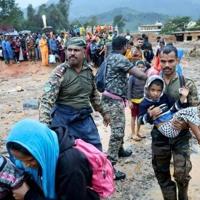Search efforts for survivors of devastating landslides in Indian tea plantations were hindered by relentless downpours and strong winds on Wednesday. The landslides have claimed the lives of at least 160 people, predominantly laborers and their families.
The southern coastal state of Kerala has been battered by days of heavy monsoon rains, causing blocked roads in the disaster area in the Wayanad district, complicating the relief work.
Rescue teams faced challenges as the only bridge connecting the most affected villages of Chooralmala and Mundakkai was washed away. They had to use a makeshift zipline to carry bodies across the flooded waters.
Some survivors who escaped the initial landslides found themselves trapped in a nearby river that had overflowed, according to volunteer rescuer Arun Dev.
Senior police officer M.R. Ajith Kumar stated that around 500 people had been rescued following the landslides that occurred before dawn on Tuesday.
Wayanad is known for its tea estates that heavily rely on a large labor force. Several homes accommodating the workers were engulfed by mud as the landslides struck while they slept.
The catastrophe has claimed 160 lives so far, with thousands seeking shelter in relief camps.
Despite the challenging conditions, more rain and strong winds are expected in the coming week, posing a threat of further damage.
– ‘Incessant rains’ –
Indian opposition leader Rahul Gandhi, who previously represented Wayanad in parliament, expressed his concern for the region but was unable to visit due to adverse weather conditions.
Monsoon rains are crucial for agriculture in the region but also bring devastation, with experts attributing the increase in fatal landslides to climate change.
India has seen a rise in disasters triggered by heavy rainfall, with experts warning of more severe impacts in the future.
Development projects, deforestation, and climate change have contributed to the increasing toll of natural disasters in India.
India’s worst landslide in recent history occurred in 1998, resulting in the deaths of at least 220 people in the Himalayan village of Malpa.
ash/gle/pbt





